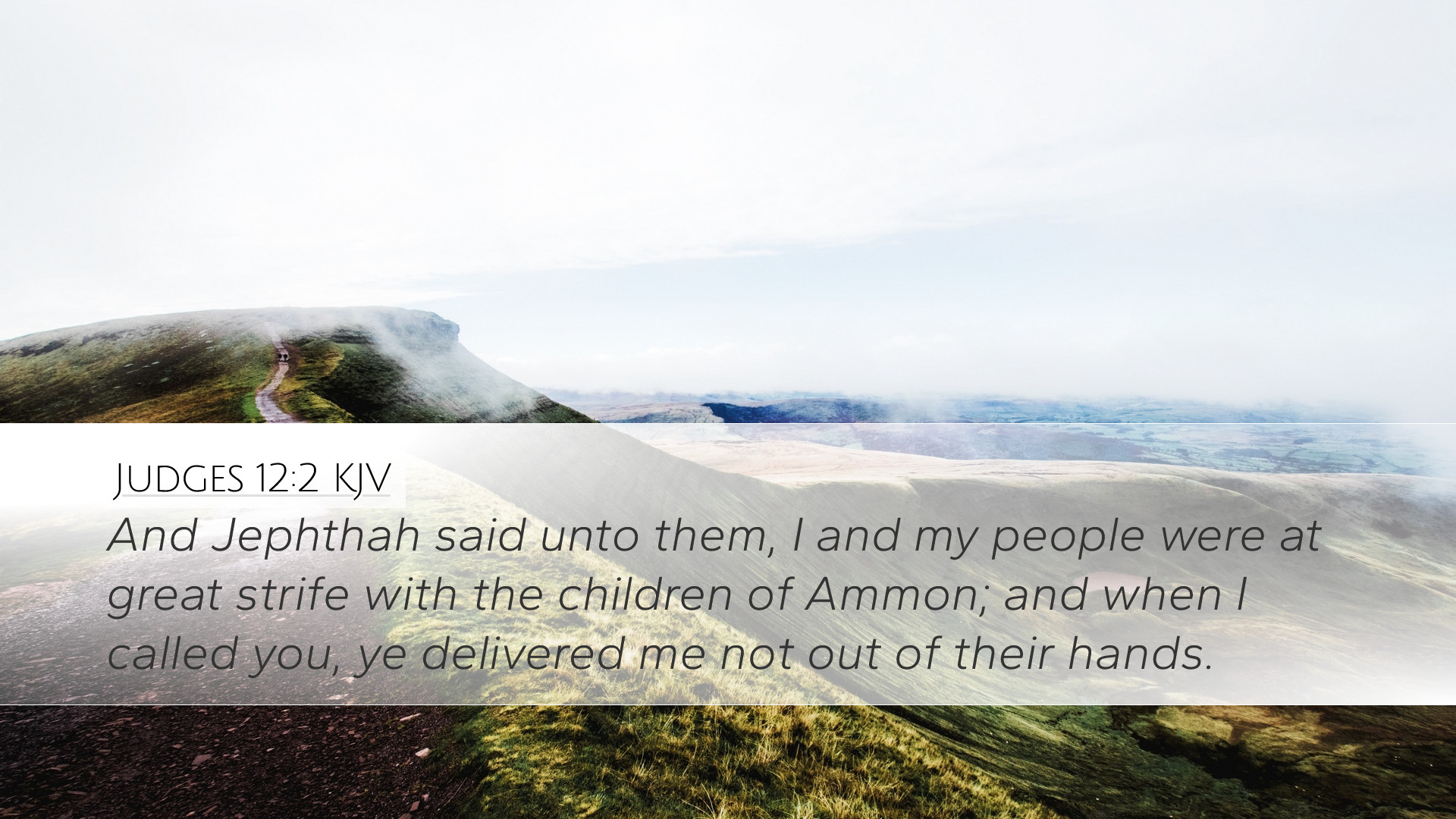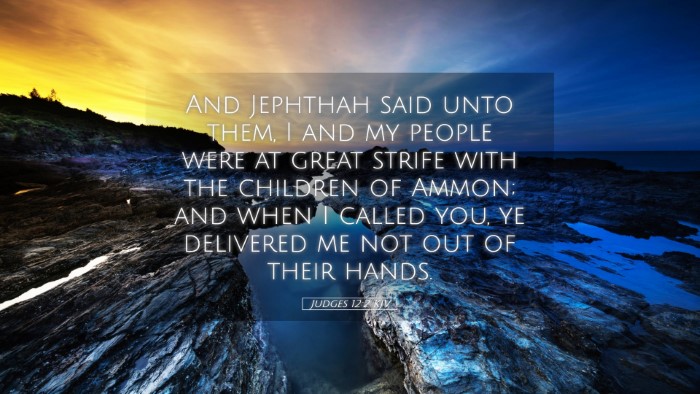Old Testament
Genesis Exodus Leviticus Numbers Deuteronomy Joshua Judges Ruth 1 Samuel 2 Samuel 1 Kings 2 Kings 1 Chronicles 2 Chronicles Ezra Nehemiah Esther Job Psalms Proverbs Ecclesiastes Song of Solomon Isaiah Jeremiah Lamentations Ezekiel Daniel Hosea Joel Amos Obadiah Jonah Micah Nahum Habakkuk Zephaniah Haggai Zechariah MalachiJudges 12:2
Judges 12:2 KJV
And Jephthah said unto them, I and my people were at great strife with the children of Ammon; and when I called you, ye delivered me not out of their hands.
Judges 12:2 Bible Commentary
Bible Commentary on Judges 12:2
Text of Judges 12:2 (KJV): "And Jephthah said unto them, I and my people were at great strife with the children of Ammon; and when I called you, ye delivered me not out of their hands."
Introduction
The verse in Judges 12:2 comes from a complex narrative surrounding the character of Jephthah, a judge of Israel. This passage illustrates the ongoing conflict between the Israelites and the children of Ammon, emphasizing themes of leadership, betrayal, and the often complicated relationships within the Israelite tribes. By drawing insights from Matthew Henry, Albert Barnes, and Adam Clarke, we dissect this significant verse to provide a multi-faceted understanding for pastors, students, theologians, and scholars alike.
Context of Jephthah's Leadership
Historical Background: Jephthah is introduced in Judges 11 as a mighty warrior who was rejected by his own people due to his illegitimate birth yet rose to lead them against the Ammonites. His leadership is a testament to God's sovereignty, as He often chooses the least likely individuals to fulfill His purposes.
Matthew Henry's Insights
Matthew Henry observes that Jephthah's statement reflects the misunderstandings and conflicts within the tribes of Israel. He notes that despite Jephthah's efforts to rally support against a common enemy, he faced abandonment from his own brethren. Henry also elaborates on how this verse represents a call to unity among the different tribes, urging that they should support one another in times of crisis.
Albert Barnes's Observations
Albert Barnes elaborates on the strained relationships among the tribes of Israel, pointing out that Jephthah's frustrations were not merely personal but indicative of a larger issue within Israelite society. He highlights the importance of cooperation and assistance, especially when facing external threats. Barnes emphasizes that Jephthah’s call to arms should have been met with unity rather than neglect.
Adam Clarke's Commentary
Adam Clarke provides a thorough exegesis, noting that Jephthah's appeal was grounded in the historical context of the struggle between Israel and Ammon. Clarke emphasizes that Jephthah's rhetorical question, “when I called you, ye delivered me not,” serves as a poignant reminder of the responsibilities of leadership and accountability among allies. He suggests that this question also calls to attention the discord and mutual accusations present among the tribes.
Thematic Exploration
Betrayal and Abandonment: The sense of betrayal expressed in Judges 12:2 resonates deeply in many modern congregations. Leaders often face challenges not just from outside, but from within their communities. The abandonment Jephthah experienced serves as a sobering reminder of the fragility of both alliances and leadership.
Unity in Adversity: The verse calls for reflection on the nature of community during times of strife. Jephthah's lament is a call to recognize the common ground that should exist among believers, particularly when confronting larger existential threats. The teachings from Henry, Barnes, and Clarke all reinforce the necessity of unity and solidarity.
The Implications for Leadership
Jephthah’s leadership, marked by his unique background and experiences, serves as a blueprint for contemporary leaders in the church. In light of Henry’s, Barnes’, and Clarke’s analyses, leaders are reminded of the importance of their calling to serve and unite their people in times of trial.
Lessons from Jephthah
- Resilience: Jephthah’s ability to lead despite rejection highlights the importance of resilience in leadership.
- Seeking Cooperation: The failure of other tribes to support Jephthah underscores the need for cooperative strategies in ministry.
- Accountability: Leaders must create a culture of accountability, teaching communities to support one another actively.
Conclusion
Judges 12:2 offers profound insights into the dynamics of leadership, community responsibility, and the nature of conflicts faced within congregations. Through the lenses of Matthew Henry, Albert Barnes, and Adam Clarke, we are reminded of the need for unity, support, and accountability among God’s people. As modern believers study this passage, they are called to reflect on their own roles within the body of Christ, ensuring that, like Jephthah, they strive for a stronger, more united community in the face of adversity.


